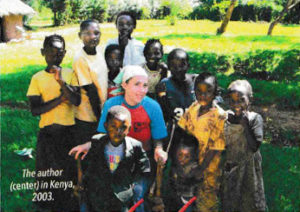“The Other Kristen” by Kristen Roupenian (Kenya)
Thanks for a ‘heads up’ from Bea Hogan (Uzbekistan 1992-94)
The Other Kristen
Kristen Roupenian joined the Peace Corps to serve her fellow man, but she found herself trying to best the ultimate woman instead.
•
When I arrived in Kenya as a Peace Corps volunteer (PCV) in 2003, I was the youngest in my group. Life in an unfamiliar culture can be infantilizing: You’re dependent on others to teach you basic skills (this is how you dress, wash, use the toilet), your new language reduces you to baby talk (“Please where bus please?”), and you end the day exhausted by the glut of information your puny brain has taken in. Still, at 21, I was adept at dependence and incompetence, and in this case my expertise served me well.
I was assigned to a site in rural western Kenya that was affiliated with an orphans center named Siguli; I would live with its headmaster, Joshua, and his family in a hut without electricity or running water. The site was new, developed by two former PCVs, Kristen and Eddie. Most of the schools, NGOs, clinics, and other organizations that request PCVs are embedded in the thick network of foreign aid that permeates the countries where the Peace Corps operates. But Siguli existed largely apart from this network. It was a truly grassroots operation.
I liked Joshua instantly — he had a big bald head and a snuffling laugh — and I wanted him to like me. Which he did, in large part, it seemed, because my name was also Kristen. “What a coincidence! This is very good luck,” he said. “You will be successful here. I have a feeling.” He handed me a huge guidebook to Siguli that Eddie and Kristen had written. It included one-, three -, and five-year plans that I would be tasked with carrying out. My stomach sank.
 When other volunteers went to their sites, many reported having trouble persuading local children to call them by their names instead of mzungu, or white person. Wherever I went, cries of”Kristen!” followed me like birdsong. Apparently, we were indistinguishable. As I got off the bus at the dirt road that led to Siguli, I practiced the Swahili I’d use to instruct the passenger-bicycle driver who’d take me the rest of the way, but it turned out I didn’t need to. “Kristen!” he said, approaching me as I disembarked with my luggage . “You are going home?”
When other volunteers went to their sites, many reported having trouble persuading local children to call them by their names instead of mzungu, or white person. Wherever I went, cries of”Kristen!” followed me like birdsong. Apparently, we were indistinguishable. As I got off the bus at the dirt road that led to Siguli, I practiced the Swahili I’d use to instruct the passenger-bicycle driver who’d take me the rest of the way, but it turned out I didn’t need to. “Kristen!” he said, approaching me as I disembarked with my luggage . “You are going home?”
According to Joshua, Eddie and Kristen were fluent in Swahili and Luhya, the local mother tongue. They loved Kenyan food, always requesting seconds. They were very strong and enjoyed working in the fields all day. In that region, women in trousers was a fraught issue; Joshua ‘s conservative congregation frowned on them. I asked him what I should wear, and he said, “You can choose.” When I asked what the Other Kristen had worn, he said, “She wore skirts.” Of course she did .
I was bad at working in the fields; the time I tried, I was so clumsy that Florence, Joshua’s wife, snatched the hoe away for fear I’d hurt myself. I couldn’t finish one plate of food, never mind seconds; every meal was so heavy. I felt like a kid stuck in a sibling’s shadow — only this sibling had the same name, most people couldn’t tell us apart, and I was worse at everything.
Joshua gave me a Luhya name: Nabonwe. The Other Kristen had been Nang’ayo. (Incidentally, Nabonwe meant, roughly, “she who will die if she swallows a kidney,” while Nang’ayo meant something like “she who will die if she’s hit by a palm leaf.”)
As part of the plan he’d developed with Eddie and Nang’ayo, Joshua founded a tree nursery, which he named Kristen ‘s Tree Nursery, then ran it himself because I didn’t know the first thing about trees. Still, he told everyone how successful my project was, while I sat on the ground like a child, poking seedlings into dirt.
Time passed. I kept studying Swahili. The calls of “Kristen” that followed me were replaced with “Nabonwe.” Eventually, I had questions for Kristen and Eddie that weren’t covered in their manual. I asked for Kristen’s email, and I noticed Nang’ayo was spelled funny in her address. I asked Joshua about it. He said gently, “It’s spelled incorrectly . She was still learning.” Well, well, well. Kristen, linguistic genius, had spelled her own name wrong!
One day after I’d been at Siguli a year, Joshua and I were looking at pictures. I saw one of Kristen Nang’ayo standing in the fields, a hoe slung over her shoulder. “Joshua!” I said. “Kristen Nang’ayo is wearing trousers! You said she didn’t wear trousers!”
Joshua frowned. “Kristen Nang’ayo sometimes wore trousers. For example, when she worked in the fields.”
“But she worked in the fields every day. She must have worn trousers all the time!”
By then, I’d tossed my pants; my wardrobe consisted mostly of ankle-length skirts. Joshua looked at me and said something I think of whenever I’m tempted to compare myself unfavorably to someone else: “Yes, but other times, on other days, she wore skirts.”
•
KRISTEN ROUPENIAN (Kenya 2003–05) is the author of the short-story collection You Know You Want This.
This story was first published in the March 2019 issue of The Oprah Magazine
Thank you so much!